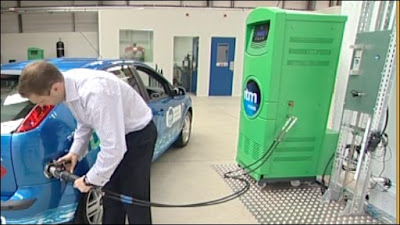
Hydrogen refuel station unveiled
By BBC News
7-9-08
A hydrogen refuelling station which could be installed in the home as an alternative to visiting a petrol station has been unveiled.
Users will need a hydrogen-powered car to go with it although the system can also be used for heating and cooking.By BBC News
7-9-08
A hydrogen refuelling station which could be installed in the home as an alternative to visiting a petrol station has been unveiled.
Hydrogen has long been touted as an alternative energy source to carbon-hungry fossil fuels.
One of the biggest obstacles to wider adoption of fuel-cell vehicles is the lack of hydrogen fuelling stations.
To be used as a fuel, hydrogen must first be produced using another energy source.
While some scientists are hopeful of the fuel uses of hydrogen, many others are sceptical because it is inefficient to produce, expensive to transport and to convert into electricity.
A home refuelling station could provide much needed infrastructure to kick-start a hydrogen-based economy, thinks Sheffield-based ITM Power, the firm behind the system.
Hydrogen fridge
The hydrogen home refuelling station works via an electrolyser which produces the gas from water and electricity.
An internal combustion generator converts the gas back into electricity to provide power for the home.
ITM Power has set up a showcase hydrogen home in Sheffield, where the gas is used for heating, cooking and to operate a fridge.
In terms of producing hydrogen to power a car, the unit can make enough gas overnight to provide fuel for 25 miles.
The hope is eventually to have higher-pressure refuelling units in public places which would be capable of offering enough hydrogen for cars to travel 100 miles.
Such units would be more expensive as they would require a hydrogen compressor which costs around £20,000.
But ITM thinks its system has the potential to revolutionise the move to more green energy.
"Given the pressing need to reduce our dependence on fossil fuels, especially oil, and to cut CO2 emissions, the future for hydrogen as an alternative means of storing and utilising energy cost-effectively has never been brighter," said Jim Heathcote, chief executive of ITM.
David Hart, a research fellow at Imperial College, London studying hydrogen energy, questioned the cost involved and how energy efficient it would be.
"The critical element of this is how much it would cost to put such a refuelling station in your home. The technology is very plausible but there are some issues about public acceptance," he said.
The fact that the refuelling station uses electricity meant it would not be a much-sought after zero emissions system unless the electricity itself is produced in a more green way, he added.
According to Mr Heathcote, the unit - which is currently only a prototype - could be commercially available as soon as the end of this year.
If they were mass produced he estimates they would initially cost around £2000.
He see the first market for the product as being large companies which use a lot of vehicles such as the Post Office.
But eventually it will become common in homes, he thinks. He said that the next stage of the firm's work would be to produce a liquid fuel.
Hydrogen cars
At the launch of the home refuel station, ITM also showed off a hybrid Ford Focus car converted to run on hydrogen.
The car needed three pieces of hardware to make it petrol-free - a hydrogen tank, which cost around £3000, four hydrogen injectors (about £100 each) and a chip to allow the conversion.
Last month, Japanese car manufacturer Honda began the first commercial production of a zero-emission, hydrogen fuel-cell powered vehicle.
Honda claims the vehicle offers three times better fuel efficiency than a traditional, petrol-powered car and plans to produce 200 of the cars over the next three years.
Prime minister Gordon Brown has said that he wants all new cars sold in Britain by 2020 to be electric or hybrid vehicles producing less than 100 grams of carbon dioxide per kilometre.
But Jon Gibbins, part of the hydrogen energy team at Imperial College, is not convinced that ITM's hybrid car will be the solution.
"Unless the hydrogen is used in a fuel cell then hydrogen vehicles are very inefficient. For a conventional engine, perhaps 20% of the energy in the electricity ends up driving the wheels versus maybe 75% for an electric vehicle."
"This seems unlikely to be a sustainable use of the limited supplies of renewable or low-carbon energy," he said.

No comments :
Post a Comment
Dear Reader/Contributor,
Your input is greatly appreciated, and coveted; however, blatant mis-use of this site's bandwidth will not be tolerated (e.g., SPAM, non-related links, etc).
Additionally, healthy debate is invited; however, ad hominem and or vitriolic attacks will not be published, nor will "anonymous" criticisms. Please keep your arguments/comments to the issues and subject matter of this article and present them with civility and proper decorum. -FW